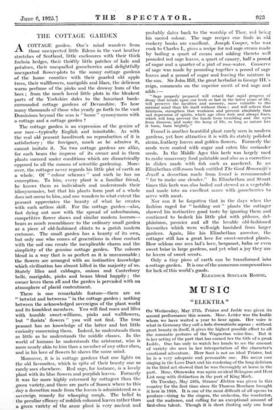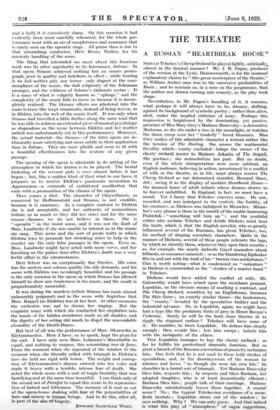MUSIC.
"ELEKTRA"
ON Wednesday, May 27th, Tristan and Isolde was given its second performance this season. Mme. Leider was the Isolde whom we have waited a year to hear again. Her voice is what in Germany they call a hohe dramatische sopran : without great beauty in itself, it gives the highest possible effect to all the romantic gestures of the Wagnerian voice-line. But it is her acting of the part that has earned her the title of a great Isolde. One has only to watch her hands to see the amount of variety she uses in her interpretation of the character's emotional adventure. Herr Soot is not an ideal Tristan, but he is a very adequate and personable one. His ngezza voce singing in the Love Duet and his rendering of the long delirium in the third act showed that he was thoroughly at home in the part. Mme. Olczewska was again an ideal Briingane and Herr List sang with distinction in the part of King Mark.
On Tuesday, May 26th, Strauss' Ekktra was given in this country for the first time since Sir Thomas Beecham brought it here in 1910. It is one of the most difficult of all operas to produce—tiring to the singers, the orchestra, the conductor, and the audience, and calling for an exceptional amount of first-class talent. Though it is short (lasting only one hour
and a half) it is excessively sharp. On this occasion it had evidently been most carefully rehearsed, for the whole per- formance went with an air of completeness and assurance that is rarely seen on the operatic stage. All praise then is due to that astonishing conductor, Herr Bruno Walter, for his masterly handling of the score.
The thing that astounded me most about this ferocious work was its utter superiority to its forerunner, Salome. In that opera Strauss achieved nothing but an ornate porno- graph, poor in quality and indefinite in effect ; while hearing it we feel neither pity nor terror—only disgust at the com- monplaces of the music, the dull religiosity of the Jokanaan passages, and the coldness of Salome's elaborate eestas '. It is a mass of what is vulgarly known as splurge," and the complexity of the music fails to move us because it is incom- pletely realized. The literary effects are plastered into the main texture like inept ornaments, instead of being woven, as in Elektra, into the web of the music itself. It was only when Strauss had travelled a little further along the same road that he was able to achieve an extended piece of musical psychology as stupendous as the scene between Elektra and her mother (which was unfortunately cut in this performance). Moreover, the actual material—the themes—of the later opera are in- trinsically more satisfying and more subtle in their application than in Salome. They are more pliable and seem to fit with a beautiful effortlessness into the texture of any given passage.
The opening of the opera is admirable in its setting of the atmosphere in which the drama is to be played. The brutal bickering of the servant girls is over almost before it has begun ; but, like a sudden blast of East wind in our faces, it prepares us to receive Elektra's passionate invocation to Agamemnon—a crescendo of embittered recollection that ends with a premonition of the climax of the opera.
Then comes a blot. The character of Chrysothemis, as conceived by Hoffmanstahl and Strauss, is not credible, because it is summary. As a complete contrast to Elektra she is not acceptable, and her outbursts of womanliness irritate us as much as they did her sister and for the same reason—because we do not believe in them. She is " operatic in the worst sense, and it was not the fault of Mme. Landwehr if she was unable to interest us in the music she sang. This scene and the sort of presto waltz in which Elektra tries to persuade her shrinking sister to help in the murder are the only false passages in the opera. Even so, Mme. Landwehr might have acted with more verve, and her knocking on the palace door after Elektra's death was a very feeble affair in the circumstances.
Herr Schorr was an exceptionally fine Orestes. His voice has the austere and solemn quality the role demands, and his scene with Elektra was ravishingly beautiful, and his passage is the only occasion in the opera on which Strauss has allowed himself to show any tenderness in his music, and the result is proportionately successful.
It was during the murders (which Strauss has made almost unbearably poignant) and in the scene with Aegisthus that Mme. Kappel (as Elektra) was at her best. At other moments the orchestra was apt to drown her singing. But the exquisite irony with which she conducted her stepfather into the hands of the hidden murderers made us all shudder, and the dignity of her acting did much to dispel the unavoidable absurdity of the Death-Dance.
But best of all was the performance of Mme. Olczewska as Klytemnaestra. Here I have, so to speak, kept the plum for the end. I have only seen Mme. Lehmann's Marschallin to equal, and nothing to surpass, this astonishing four de force. From the moment when she appeared at the window to the moment when she literally yelled with triumph in Elektra's face she held me rigid with terror. The weight and corrup- tion of Klytemnaestra's disease entered into her voice and made it heavy with a terrible, intense fear of death. She acted the whole scene with a sort of tragic brutality that was horrifying and at the same time beautiful. I can think only of the second act of Pars(fal to equal this scene in its representa- tion of hatred and bitterness. The memory of it sent us out of the opera-house shaking with fear at the 'potentialities of hate and misery in human beings. And to do this, after all, is part of the aim of tragedy.
EDWARD SACICVILLE WEST.















































 Previous page
Previous page